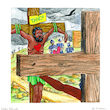Let the Church Say Amen
About this article
The word "Amen" remains one of the few Hebrew words in our religious vocabulary. We say it many times in the course of prayer and read it often in the gospels. What does this word mean? Where did it come from? This brief article from U.S. Catholic explores these questions. Suitable for teacher background and student reading.Amen is a cry of complete reliance, of heartfelt abandonment to something or someone that is true and trustworthy.
THE TWO-SYLLABLE WORD COULD BE HEARD by all in the front quarter of the sizeable church. It was said by a neighbor–a man given to pronouncing amen, at the appropriate moments during Mass, with enough force that it stood out from the general murmur of the rest of us. To my adolescent powers of perception, those nearest him seemed to have an attitude of tolerance toward this behavior, perhaps even forbearance.
That was 30 years ago. It was then that I first became aware of amen as a word worth thinking about This was a time when Catholics were moving inexorably to a participative form of worship involving the use of our own language. But what was it in this fellow worshiper's manner of response at Mass that captured his neighbors' attention? He seemed to think this response mattered particularly, and was meant to stand out.
Over the intervening years I have learned that this man was on to something. Amen is one of the few words in our religious vocabulary that remains in Hebrew, like alleluia and hosanna. It is virtually impossible to translate. Various attempts have been made, for example, "so be it," "may it be so," "truly," or, more archaic still, "verily." Biblical scholars in this century have studied closely the ancient roots of many Hebrew words. Their scholarship indicates that if translated literally, amen would actually mean something like, "I will drive my tent peg into that." No wonder we are content to keep the Hebrew word.
To grasp the force of such an expression, we need only consider the ancient nomadic and desert culture in which the Hebrew language developed. A desert can be a ravishingly beautiful but very treacherous place: brutally hot by day, viciously cold at night. In such an environment, the place chosen to anchor one's tent determines whether this shelter will withstand the desert winds that can come so suddenly. It is a matter of life and death. Do the pegs of the tent grasp shifting sand or stable, solid soil?
Seen in this light, amen is much more than the intellectual assent or approval that many sources seem to assign to it. Amen is a cry of complete reliance, of heartfelt abandonment to something or someone that is true and trustworthy. By it, Christian people declare the solid ground of our being, and that is Christ, the one who is our journey's beginning and goal.
Amen is a word worth thinking about. We have heard and said it many times a year, some of us over many years. As a key piece of our religious vocabulary, it speaks to a fundamental human need to hear and say what is true. From childhood and into adulthood, we struggle to find ways to assure others when we are telling the truth ("Cross my heart and hope to die"). We also have a deep need to affirm when the truth has been spoken or a reliable promise made ("I believe you"). It is essential to our life and health to be able to say and affirm what is true or promissory.
There is a deep-seated hunger at the heart of human existence that is fed on promises made, truths spoken, and lives that embody them. Of course, promises are broken daily, and what is true can be ignored. But we know intuitively that without the struggle to be true and faithful to one another, life would be even more harsh, chaotic, and intolerable than it sometimes is.
I try to make the heartfelt conviction of that two-syllable word my own. Amen is our cry of belonging to Christ, the one whose promises can be fully trusted, who is shelter and guiding star in the desert we sometimes make of our lives. Through saying amen, maybe I will learn again how to make and keep the promises and words of truth I owe to those I love and try to serve.
The gentleman in the pew near me 30 years ago had an intuition from which I continue to learn. Now my own children look a little uncomfortable with their father when it comes time to say amen at Mass. They have a lot to learn!
Acknowledgments
This article first appeared in U.S. Catholic magazine and is reprinted here by permission of the author and U.S. Catholic. For more helpful articles from U.S.Catholic, visit their web site at http://www.uscatholic.org.Published April 1, 1996.





